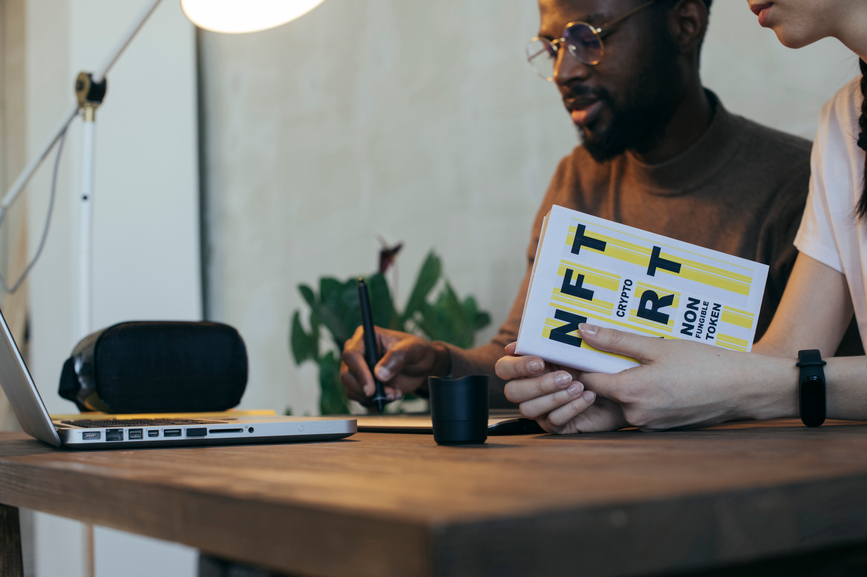Advocating for artists on the blockchain
Althea Erickson
Althea Erickson is the Director of the Sol Center for Liberated Work, a program of the Center for Cultural Innovation. Previously, Althea was the Vice President of Global Government Affairs and Impact at Etsy, and Advocacy & Policy Director at Freelancers Union.
Artists’ economic security depends on their ability to own and control their intellectual property rights, but they often lack the means or bargaining power to protect those rights.
For example, musicians often forgo rights to their work when signing record deals, while freelance writers must often sign contracts that give publishers full rights to their work in all forms in perpetuity. Unlike in many other countries, US visual artists don’t have a means to collect resale royalties on their work, even as those pieces grow in value over time.
The blockchain offers exciting opportunities for artists to take more control over their work, and expands ways for them to earn income from that work. It allows for more direct connection between artists and their fans, circumventing traditional gatekeepers. Through smart contracts and the metadata associated with NFTs, artists can set and enforce the terms of their license agreements in their work, including enabling many to collect resale royalties for the first time.
Given the opportunities and lack of traditional gatekeepers, it’s not surprising that many Black and Brown artists and creatives moved quickly into the space. Black individuals have been at the forefront of participating, legitimizing, and shaping the development of blockchain-based financial markets, activities, community forums, and art. We follow the artists we serve where they go, which is why we started exploring and learning about the web3 space.

We quickly learned that while the opportunities are significant, so are the risks, especially when it comes to artists protecting themselves and their work. In particular, the platforms themselves have significant power to set and enforce terms, limiting the promise of true self-determination for creatives.
To truly capture the ownership opportunities the blockchain offers, artists moving into the space need tools and information to help them set and enforce their rights. That’s why we commissioned Alex Glancy at the law firm Gundzik Gundzik Heeger LLP to write a report on the legal issues artists face on the blockchain (report forthcoming).
Given our interest in the issue, we were excited to learn in late 2022 that the U.S. government had undertaken a study into the issues surrounding intellectual property and NFTs. Policymakers are exploring whether current intellectual property laws need to be updated or changed, given the new technology. The U.S. Senate Subcommittee on Intellectual Property requested that the US Copyright Office and US Patent and Trademark Office undertake a joint study exploring intellectual property issues and NFTs. As part of that study, the Offices requested written comments, as well as hosted several public roundtables on the topic.
We worked with other stakeholders from the arts community to collect feedback on the issues artists and creatives face in the NFT space, and collaborated with Alex to develop comments to the USPTO/USCO study. We also participated in one of the public roundtables the Copyright Office organized, advocating on behalf of the creatives CCI serves, especially those from marginalized communities. You can read our submission here, and watch the roundtable here.
In advocating for the arts workers and creatives we serve, we made four major points:
- Artists need better tools to understand and influence the ways NFT marketplace terms impact their intellectual property rights, including the ability to assess terms, determine licenses, as well as choose or change platforms
- There is significant legal uncertainty regarding the ways copyright law and contract law overlap on the blockchain, which creates copyright management and enforcement challenges for creators and inconsistencies in enforcement
- As is the case off the blockchain, small creators need education and technical assistance to help them protect and manage their intellectual property on the blockchain, in particular given the high barriers to informed entry in the market and the lack of trusted advisors, especially within marginalized communities
- While the blockchain offers ways small creators can support themselves via direct payments and resale royalties, we worry about their overdependence on too-few platforms that could potentially use their market power to strip artists of ownership of artwork, rights to reproduce, trademark, and other economic opportunities.
Yes, we’re excited about the opportunities blockchain technologies offer for arts workers to control and derive economic benefits from their work. However, lack of information, tools, support and means to exert collective power may undermine the potential of these technologies to help creators – especially creators from marginalized communities – achieve greater self-determination.
Contributing to this public study was just the first step we’re taking to advocate for artists’ ownership rights in this space. In the days to come, we’ll be publishing the report drafted by Alex Glancy on legal issues artists face on the blockchain, sharing artists’ experiences and challenges with lawmakers, and continuing to collaborate with our peers to uplift their voices in the public debate.
Have a story to share about your experience using blockchain technologies? We’d love to hear it here!